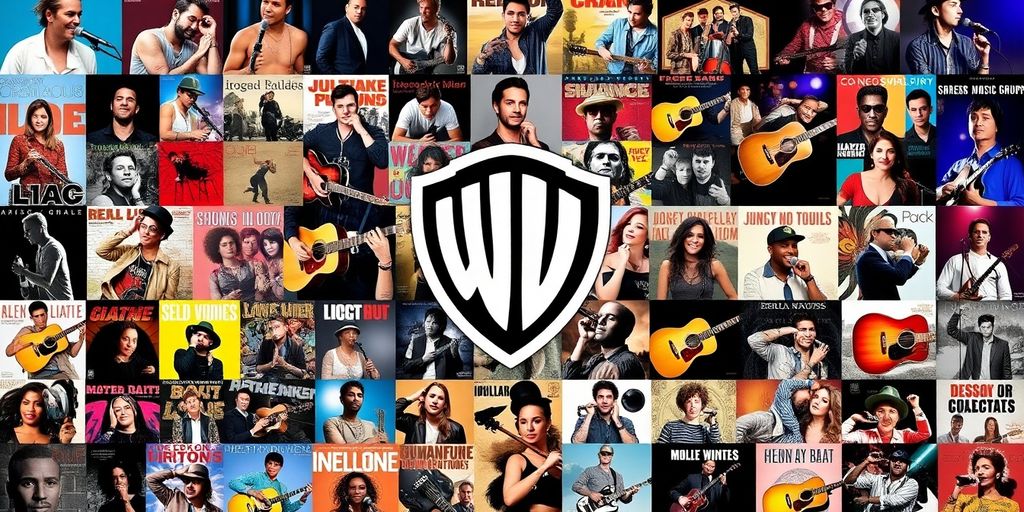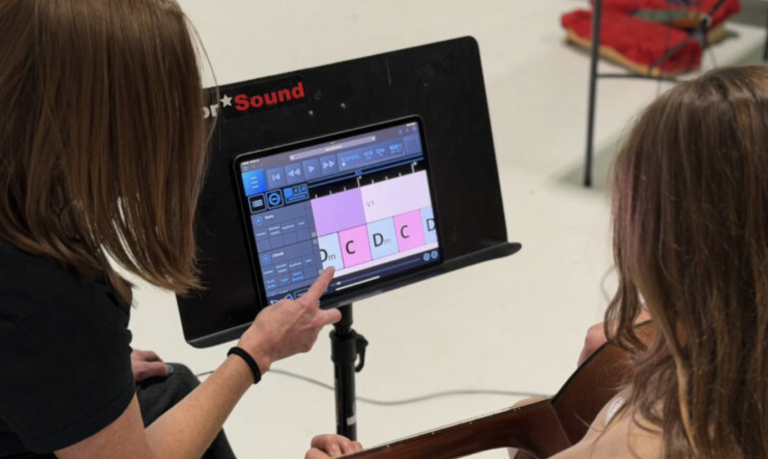
Warner Music Group has been a significant player in the music industry for decades, shaping the soundscape and influencing global music culture. From its humble beginnings to its current status as a powerhouse in music production and artist development, WMG’s journey is a fascinating tale of innovation, adaptation, and growth. This article explores the evolution of Warner Music Group and highlights its impact on the music world and beyond.
Key Takeaways
- Warner Music Group has a rich history that dates back to its founding, with key milestones that have shaped its identity.
- The company encompasses a variety of labels, from major brands to independent ones, showcasing a wide range of musical genres.
- WMG is committed to supporting emerging artists through innovative development programs and cutting-edge technology.
- Recent leadership changes at WMG are aimed at enhancing its market position amid the digital transformation of the music industry.
- The group’s global expansion includes strategic acquisitions and efforts to engage with local music cultures around the world.
The Legacy of Warner Music Group

Founding and Early Years
Warner Music Group’s story starts way back, and it’s pretty interesting how it all came together. It wasn’t always the giant it is today. The early days were about building a foundation, signing artists, and figuring out the music business. It’s cool to see how much things have changed since then. Warner Records has a rich history.
Key Milestones in History
WMG has had some seriously big moments that shaped the music industry. Think about the artists they’ve launched, the records they’ve broken, and the trends they’ve set. It’s not just about selling music; it’s about creating culture.
Here are a few milestones:
- Acquisition of major labels, expanding their reach.
- Pioneering new music formats, like CDs and digital downloads.
- Global expansion into emerging markets.
Influence on Global Music Culture
WMG’s impact goes way beyond just selling records. They’ve helped shape what we listen to, how we listen, and even how we think about music. They’ve introduced different genres to new audiences and supported artists who push boundaries. It’s a huge responsibility, and they’ve played a big role in making music a global language.
It’s easy to forget how much the big music companies influence what we hear every day. They’re not just businesses; they’re cultural gatekeepers. They decide who gets heard and who doesn’t, and that has a ripple effect on everything from fashion to film to the way we express ourselves.
Warner Music Group’s Diverse Labels
Warner Music Group (WMG) isn’t just one big label; it’s a house to many, each with its own flavor and focus. This structure allows WMG to reach different audiences and support a wide range of artists. It’s like having a bunch of smaller, specialized teams all working under one roof.
Overview of Major Labels
WMG boasts some of the most recognizable names in the music industry. These major labels operate with significant resources and infrastructure, enabling them to support established artists and break new talent on a global scale.
- Atlantic Records: Known for its diverse roster spanning pop, rock, R&B, and hip-hop. They’ve been a powerhouse for decades, consistently shaping popular music. Elektra Records also falls under the Atlantic Music Group.
- Warner Records: A flagship label with a long history of iconic artists. They continue to be a major player in pop, rock, and alternative music. Warner Records now includes oversight of Warner Music Nashville, along with Nonesuch and Reprise.
- Parlophone: While having a rich history, Parlophone continues to evolve, signing new artists and pushing boundaries in various genres.
Independent Labels Under WMG
Beyond the major players, WMG also supports a network of independent labels. These labels often focus on niche genres or developing emerging artists, providing a crucial platform for unique voices. WMG’s support for the independent community is also shown through ADA.
- Fueled By Ramen: A go-to label for pop-punk and alternative rock. They’ve launched the careers of many successful bands in these genres.
- Roadrunner Records: A leading label in the heavy metal and hard rock scene. They’ve been instrumental in shaping the sound of these genres for years.
- Spinnin’ Records: A dominant force in electronic dance music (EDM). They’ve helped propel many DJs and producers to international fame.
Genre Diversity and Representation
WMG’s strength lies in its ability to represent a wide spectrum of musical genres. This diversity not only enriches the music landscape but also allows WMG to connect with a broader audience. The company’s commitment to genre diversity is evident in its varied roster of labels and artists.
- From pop and rock to hip-hop, country, electronic, and classical, WMG covers a huge range of musical styles.
- This diversity extends to representing artists from different cultural backgrounds and perspectives.
- WMG’s labels actively seek out and support artists who are pushing boundaries and challenging conventions within their respective genres.
Warner Music Group’s structure, with its mix of major and independent labels, allows it to be both a global powerhouse and a champion of niche music scenes. This approach ensures that a wide range of artists have the opportunity to reach their audiences and contribute to the ever-evolving world of music. The recent reorganization of recorded music operations shows their commitment to growth.
Innovations in Artist Development

Warner Music Group has really stepped up its game when it comes to helping artists grow. It’s not just about signing a deal anymore; it’s about building careers that last. They’re trying new things all the time, and it’s pretty cool to see.
Support for Emerging Artists
WMG is putting a lot of effort into finding and nurturing new talent. They’ve got programs designed to help artists develop their sound, improve their performance skills, and learn the business side of things. It’s like a music school, but with a record deal at the end. This support is super important for artists just starting out.
Here’s a quick look at some of the support they might offer:
- Mentorship programs connecting new artists with established musicians.
- Funding for recording sessions and music video production.
- Workshops on songwriting, stage presence, and social media marketing.
Technological Advancements in Music Production
Technology is changing everything, and WMG is right there in the middle of it. They’re using new tools and techniques to help artists create better music, faster. Think AI-powered mixing software, virtual reality music videos, and interactive live streams. It’s all about pushing the boundaries of what’s possible. Zerza’s experience in gaming may influence the music industry.
Collaborative Projects and Partnerships
WMG understands that collaboration is key. They’re always looking for ways to bring artists together, whether it’s through songwriting camps, joint tours, or cross-genre collaborations. They also partner with tech companies, brands, and other organizations to create new opportunities for their artists. It’s all about building a strong network and creating a community.
WMG is really focused on creating an environment where artists can thrive. They know that the music industry is constantly changing, so they’re always looking for new ways to support their artists and help them reach their full potential. It’s not just about making money; it’s about making great music and building lasting careers.
Financial Strategies and Market Positioning
Recent Leadership Changes
Leadership shifts can really shake things up, and Warner Music Group is no exception. It’s like when your favorite band gets a new lead singer – things are bound to sound a little different. A recent case study shows that leadership change in any company can lead to varying results. The appointment of a new CEO or CFO often signals a shift in financial strategy, potentially impacting investment decisions and overall market approach. These changes can bring fresh perspectives on how to tackle industry challenges, like balancing traditional revenue with streaming monetization. It’s all about finding that sweet spot where innovation meets tradition.
Impact of Digital Transformation
Digital transformation has completely changed the game for the music industry. It’s not just about selling CDs anymore; it’s about streaming, downloads, and all sorts of online platforms. This shift has forced Warner Music Group to rethink its financial strategies and market positioning.
Here’s a quick look at how digital transformation has impacted revenue streams:
- Increased reliance on streaming revenue.
- Decline in physical album sales.
- Growth in digital downloads and online subscriptions.
- New opportunities in licensing and synchronization.
The digital age presents both opportunities and challenges. Warner Music Group must adapt to changing consumer habits and technological advancements to remain competitive. This includes investing in new technologies, exploring new revenue models, and protecting intellectual property rights in the digital space.
Revenue Growth and Future Projections
Warner Music Group’s revenue growth is a key indicator of its financial health and market position. Keeping an eye on earnings forecasts & projections is important. While past performance isn’t a guarantee of future success, it does provide insights into the company’s ability to generate revenue and increase profitability. Future projections often involve analyzing market trends, consumer behavior, and technological advancements. For example, if they are looking into venture capital, it could mean they are looking to invest in new technologies. Here’s what they need to consider:
- Projected growth in streaming revenue.
- Potential for expansion into new markets.
- Impact of strategic acquisitions on revenue.
- Investment in artist development and new talent.
Global Expansion and Market Reach
Operations in Key Regions
Warner Music Group’s global strategy is pretty interesting. They don’t just focus on the US and Europe; they’re all about getting their music out everywhere. I think it’s smart how they tailor their approach to fit each region’s unique music tastes and market conditions. It’s not a one-size-fits-all thing, and that’s what makes them stand out. For example, they might push different genres in Asia compared to Latin America, based on what’s popular there. This localized approach helps them connect with fans on a deeper level and build a stronger presence in each market. In 2024, the program expanded its global reach and developed leadership networks.
Strategic Acquisitions
WMG has been on a bit of a buying spree, picking up smaller labels and music-related companies left and right. These acquisitions aren’t just about getting more artists under their umbrella; it’s about expanding their reach and influence in different markets and genres. It’s like they’re building a music empire, one piece at a time. They’re not just buying companies; they’re buying expertise, connections, and a deeper understanding of local music scenes. It’s a pretty smart way to grow and stay relevant in a constantly changing industry.
Cultural Adaptation and Local Engagement
One thing I’ve noticed about WMG is that they don’t just barge into a new market and try to force their music on everyone. They actually take the time to understand the local culture and music scene. They work with local artists, support local music events, and try to become a part of the community. It’s like they’re saying, "We’re not just here to sell music; we’re here to be a part of your culture." And that makes a big difference in how people perceive them and their artists.
It’s not just about translating lyrics; it’s about understanding the nuances of the culture and adapting their marketing and promotional strategies accordingly. This level of cultural sensitivity is what sets them apart from other global music companies and helps them build lasting relationships with fans and artists around the world.
Warner Music Group’s Role in Digital Music
The music industry has changed a lot, and Warner Music Group (WMG) has had to keep up. They’ve had to figure out how to make money and stay relevant in a world where people stream music and share it online.
Streaming Services and Partnerships
WMG was one of the first big music companies to really get into streaming. They made deals with services like Spotify and Apple Music early on. These partnerships have become a major source of revenue for WMG. They’ve also allowed WMG to reach a much wider audience than they could with just physical albums.
- Early adoption of streaming platforms.
- Strategic partnerships with key digital service providers.
- Development of data-driven insights to optimize streaming performance.
Impact of Social Media on Music Distribution
Social media is huge for music now, and WMG knows it. They’ve been using platforms like TikTok and Instagram to promote their artists and get their music out there. It’s not just about posting songs; it’s about creating content that people will share and engage with. Carletta Higginson, Chief Digital Officer at Warner Music Group, reflects on the evolution of digital service providers and their impact on the music landscape.
- Increased artist visibility through social media campaigns.
- Direct engagement with fans and building online communities.
- Use of social media data to inform marketing strategies.
Social media has completely changed how music is discovered and shared. It’s not just about radio play anymore; it’s about creating viral moments and building a fanbase online. WMG has been pretty good at adapting to this new reality.
Navigating Copyright and Licensing Challenges
One of the biggest challenges in the digital music world is copyright. It’s hard to protect music when it can be copied and shared so easily. WMG has had to work hard to make sure their artists get paid fairly when their music is used online. This involves dealing with complex licensing agreements and fighting piracy.
- Active enforcement of copyright protections.
- Negotiation of fair licensing agreements with digital platforms.
- Investment in technologies to detect and prevent music piracy.
| Challenge | WMG’s Response |
|---|---|
| Digital Piracy | Increased monitoring and legal action |
| Licensing Complexity | Streamlined processes and expert negotiations |
| Fair Compensation | Advocacy for better royalty rates |
Community Engagement and Social Responsibility
Support for Music Education
Warner Music Group’s involvement in the community goes beyond just selling records. They put a lot of effort into supporting music education programs. I think it’s really cool that they understand how important music is for kids. These programs can really help kids develop self-confidence and creativity.
For example, WMG supports initiatives like The Harmony Program, which uses music to promote social development. It’s not just about learning to play an instrument; it’s about building life skills. They also partner with schools and organizations to provide resources and opportunities for young musicians. It’s a great way to give back and help the next generation of artists.
Initiatives for Diversity and Inclusion
WMG has been making a push for diversity and inclusion, which is something I think is really important. It’s not just about ticking boxes; it’s about creating a more representative and equitable industry. They’ve launched several initiatives aimed at promoting diversity both within the company and in the music they produce.
Here are some things they’re doing:
- Mentorship programs for underrepresented groups
- Partnerships with organizations that support diverse artists
- Internal training programs to promote inclusivity
It’s great to see a big company like WMG taking steps to address these issues. It’s not always easy, but it’s definitely a step in the right direction. I think it’s important for companies to be held accountable for their actions and to continue to strive for improvement.
Environmental Sustainability Efforts
Okay, so, environmental stuff. It’s not always the first thing you think about when you think about a music company, but WMG is trying to do their part. They’ve started implementing some environmental sustainability efforts to reduce their impact. I mean, every little bit helps, right?
Here’s a quick rundown:
- Reducing carbon emissions from their operations
- Using more sustainable packaging for their products
- Supporting environmental organizations
It’s not perfect, and there’s always more that can be done, but it’s good to see them taking it seriously. Hopefully, other companies will follow suit.
Final Thoughts on Warner Music Group’s Journey
In wrapping up our look at Warner Music Group, it’s clear they’ve been through a lot over the years. From adapting to the digital age to reshaping their business model, they’ve managed to stay relevant in a fast-changing industry. The way they support artists, whether through major labels or indie partnerships, shows their commitment to music in all its forms. With new leadership and fresh strategies, WMG is set to keep pushing boundaries. As they continue to evolve, it’ll be interesting to see how they tackle future challenges and opportunities in the music world.
Frequently Asked Questions
What is Warner Music Group?
Warner Music Group (WMG) is a big company in the music industry that helps artists make and share their music all over the world.
When was Warner Music Group founded?
WMG was founded in 1929, making it one of the oldest music companies still around today.
What types of music does Warner Music Group produce?
WMG produces many different types of music, including pop, rock, hip-hop, and country, among others.
How does Warner Music Group support new artists?
WMG helps new artists by providing resources for recording, marketing, and connecting them with fans.
What are some famous labels under Warner Music Group?
Some well-known labels under WMG include Atlantic Records, Warner Records, and Elektra.
How is Warner Music Group involved in digital music?
WMG works with streaming services and uses social media to help artists reach more listeners and share their music online.








